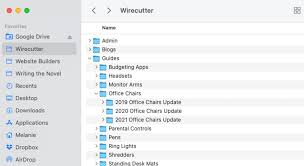
The Power of File and Folder Management Software
In the digital age, efficient organization and management of files and folders are essential for productivity and workflow optimization. File and folder management software plays a crucial role in helping individuals and organizations streamline their data storage, retrieval, and sharing processes.
These software tools offer a range of features designed to simplify file organization, improve searchability, enhance collaboration, and ensure data security. From basic file sorting capabilities to advanced metadata tagging and version control mechanisms, file and folder management software empowers users to maintain order in their digital environments.
One key benefit of using file and folder management software is the ability to categorize files based on different criteria such as date created, file type, size, or custom tags. This makes it easier to locate specific files quickly without having to sift through cluttered directories.
Moreover, many file management tools provide advanced search functionalities that allow users to find files based on keywords, content within documents, or even specific metadata attributes. This can save valuable time and effort when searching for important information across vast repositories of data.
Collaboration is another area where file and folder management software excels. By enabling multiple users to access, edit, and share files within a centralized platform, these tools facilitate seamless teamwork and information exchange among team members.
Security is also a top priority for file management software developers. Features such as encryption, access controls, audit trails, and automated backups help safeguard sensitive data from unauthorized access or loss due to system failures.
Whether you are an individual looking to organize your personal files more effectively or a business seeking to optimize your document management processes, investing in quality file and folder management software can significantly improve your efficiency, collaboration capabilities, and data security posture.
Top FAQs About File and Folder Management Software
- Which software manages files and folders?
- What is the Windows program to manage folders and files?
- What is the best file management software?
- Which program will you use for file and folder maintenance?
Which software manages files and folders?
When it comes to managing files and folders, there are various software options available to meet different needs and preferences. Popular file and folder management software includes tools like File Explorer (Windows), Finder (macOS), and Nautilus (Linux) that come pre-installed on operating systems and offer basic file organization features. Additionally, third-party applications such as Total Commander, XYplorer, Directory Opus, and FreeCommander provide more advanced functionalities like dual-pane views, batch file operations, customizable layouts, and integration with cloud storage services. Users can choose software based on their specific requirements for file management efficiency, search capabilities, collaboration features, and data security measures.
What is the Windows program to manage folders and files?
When it comes to managing folders and files on a Windows operating system, one of the most commonly used programs is File Explorer. File Explorer, previously known as Windows Explorer, is a built-in file management tool that allows users to navigate through their computer’s directory structure, view and organize files and folders, copy or move items, search for specific files, and perform various file management tasks with ease. With its user-friendly interface and robust set of features, File Explorer serves as the go-to program for managing folders and files on Windows-based PCs.
What is the best file management software?
When it comes to the question of “What is the best file management software?” the answer largely depends on individual preferences, specific needs, and organizational requirements. There is a wide range of file management software available in the market, each offering unique features and capabilities. Some popular options include Microsoft File Explorer, Finder for macOS, Total Commander, XYplorer, and Directory Opus. Factors to consider when determining the best file management software include ease of use, customization options, search functionality, collaboration features, security measures, and compatibility with your existing systems. It is recommended to explore different software options, read reviews, and perhaps even try out demos to find the solution that best fits your file organization and management needs.
Which program will you use for file and folder maintenance?
When it comes to file and folder maintenance, the choice of program depends on your specific needs and preferences. There are a variety of file and folder management software options available, each with its own set of features and capabilities. Some popular programs for file and folder maintenance include File Explorer (Windows), Finder (Mac), Total Commander, Directory Opus, XYplorer, and many others. It’s important to consider factors such as ease of use, customization options, collaboration features, security measures, and compatibility with your operating system when selecting a program for managing your files and folders effectively.
